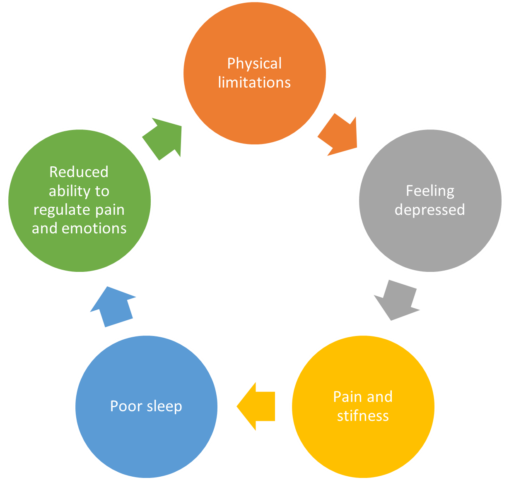Q: How can I help support the mental and emotional health of my child with JIA?
Juvenile idiopathic arthritis is the most common rheumatic disease in childhood, occurring in approximately 1:500 children. Despite a recent expansion in treatment options and improvement of outcomes, significant morbidity still occurs.
Children with JIA may experience feelings of sadness and anxiety, low self-esteem and poor self-image. Many things contribute to these feelings, such as feeling different from others and unable to keep up with their friends, and worry about what will happen to them in the future. Physical limitations, quality of sleep and pain also contribute to feelings of depression. Unfortunately, these elements can cause a vicious cycle, for example, feeling depressed reduces the motivation to be active, which can make pain and stiffness worse, which can disturb sleep onset and/or staying asleep etc (see illustration below). Children with JIA are most at risk of depression if they feel defined by having JIA, rather than feeling like a whole person with lots of different strengths and qualities.
Vicious Cycle

Tips to help your child’s emotional and mental health
- Educate and Empower: help your child understand their condition and learn to manage pain and physical limitations.
- Be open: talk openly about thoughts and feelings. For example, prompt communication and expression of feelings with these feelings sentence starters.
– I feel sad today because …
– I feel happy today because …
– I don’t like it when …
– I like it when ….
– I feel nervous when …
– I feel worried when …
– I feel embarrassed when ….
Or if talking doesn’t cut it, get your child to illustrate how they feel about certain things e.g., school, friends, their body etc. - Quality time, actions, and affirmations: Make sure to spend together to relax and have fun. Tell them that you love them, are on their side and will tackle problems together. Say how proud you are of them. Talk about the situation with the whole family and face the problem together.
- Build resilience and self-esteem: Help your child develop confidence by encouraging their efforts and demonstrating how to solve problems. Involve them in activities they enjoy and can do to build their self-esteem. Talk about how to build friendships and deal with social difficulties.
- Sleep and medications: Avoid stimulating activities like heavy exercise before bed, and drinks or food containing caffeine, such as coke, coffee, tea, and chocolate after dinner time. Talk about worries and things that are upsetting your child so they are not on their mind at bedtime. Help your child learn and practise relaxation techniques. If possible, take pain medication just before bedtime to help your child have a pain-free and uninterrupted sleep. Establish a nightly bedtime routine that helps your child relax and wind down
As a parents, you may feel you need to have all the answers and when you don’t, it can make you feel like a failure and may increase feelings of guilt, stress, worry etc. Not all these things are easy to do, so enlisting the help of a trained child psychologist and other healthcare professions may be helpful.
Further reading:
https://www.aboutkidshealth.ca/article?contentid=1080&language=english
https://kidshealth.org/en/parents/jra.html
https://www.ncbi.nlm.nih.gov/pmc/articles/PMC5681389/
16/1/2022
Author: Kat Keane, Health Educator
